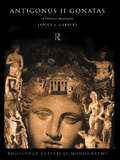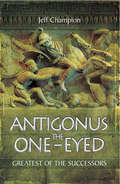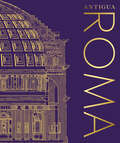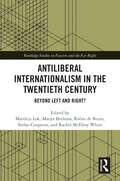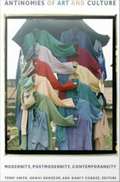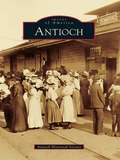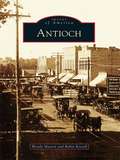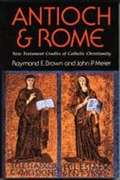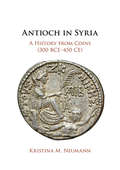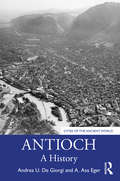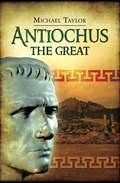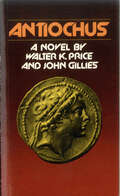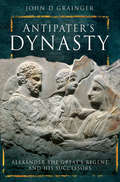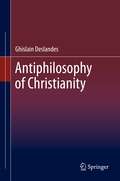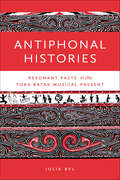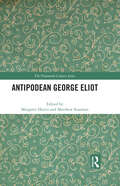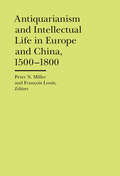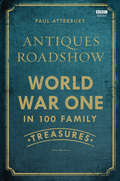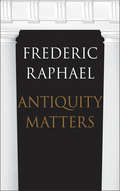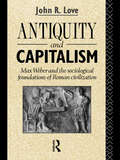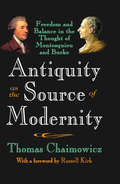- Table View
- List View
Antigonus II Gonatas: A Political Biography
by Janice J. GabbertFirst Published in 2004. Routledge is an imprint of Taylor & Francis, an informa company.
Antigonus the One-Eyed: Greatest of the Successors
by Jeff ChampionThe author of Pyrrhus of Epirus &“tells the exciting story of one of those competing to succeed Alexander the Great . . . Recommended.&” —Firetrench Plutarch described Antigonus the One Eyed (382-301 BC) as &“the oldest and greatest of Alexander&’s successors.&” Antigonus loyally served both Philip II and Alexander the Great as they converted his native Macedonia into an empire stretching from India to Greece. After Alexander&’s death, Antigonus, then governor of the obscure province of Phrygia, seemed one of the least likely of his commanders to seize the dead king&’s inheritance. Yet within eight years of the king&’s passing, through a combination of military skill and political shrewdness, he had conquered the Asian portion of the empire. Antigonus&’ success caused those who controlled the European and Egyptian parts of the empire to unite against him. For another fourteen years he would wage war against a coalition of the other Successors, Ptolemy, Lysimachus, Seleucus and Cassander. In 301 he would meet defeat and death in the Battle of Ipsus. The ancient writers saw Antigonus&’ life as a cautionary tale about the dangers of hubris and vaulting ambition. Despite his apparent defeat, his descendants would continue to rule as kings and create a dynasty that would rule Macedonia for over a century. Jeff Champion narrates the career of this titanic figure with the focus squarely on the military aspects. &“It is far time that we have a biography of one of the greatest men of Hellenistic society . . . His rise from this backwater to almost becoming the king of the entire Macedonian empire is detailed by the author.&”—A Wargamers Needful Things.
Antigua Roma (Ancient Rome)
by DKSumérgete en la historia de la Antigua Roma, desde sus orígenes en un pequeño asentamiento en el monte Palatino hasta su apogeo como imperio de más de 90 millones de personas y su tumultuoso declive.Cubriendo más de 1,000 años de historia, 'Antigua Roma' revela con todo detalle los eventos políticos, culturales y militares clave que dieron forma al Imperio Romano y explora cómo era vivir en una sociedad que sentó las bases de nuestro mundo moderno.La suntuosa fotografía y los textos fiables y atractivos cubren cada faceta de la vida de la antigua Roma, desde el arte, la filosofía y el entretenimiento hasta la ingeniería, la medicina y la guerra, mientras que los mapas detallados trazan el ascenso del poderoso Imperio Romano.Con biografías detalladas de los más grandes emperadores de Roma, desde Augusto hasta Constantino, así como de otras figuras clave (generales, filósofos y escritores), 'Antigua Roma' profundiza también en las fascinantes historias de gladiadores, panaderos y esclavos. Las calles y los edificios de Roma cobran vida con recreaciones digitales especialmente creadas para este libro, mientras que acontecimientos trascendentales como la destrucción de Pompeya se relatan con la ayuda de ilustraciones, artefactos y testimonios visuales.Bellamente ilustrado y de un alcance incomparable, 'Antigua Roma' es el libro perfecto para cualquier persona interesada en este período decisivo de la historia mundial.Immerse yourself in the history of Ancient Rome - from its origins as a small settlement on the Palatine Hill to its peak as an empire reigning over 90 million people, and its tumultuous decline.Covering more than 1,000 years of history, 'Antigua Roma'reveals in vivid detail all the key political, cultural, and military events that shaped the Roman Empire and explores what it was like to live in a society that laid the foundations for our modern world.Sumptuous photography and authoritative, engaging text cover every facet of life in ancient Rome, from art, philosophy, and entertainment to engineering, medicine, and war, while detailed maps trace the rise of the mighty Roman Empire.Featuring in-depth biographies of Rome's greatest emperors, from Augustus to Constantine, as well as key figures such as generals, philosophers, and writers, 'Antigua Roma' also delves into the fascinating stories of gladiators, bakers, and enslaved people. The streets and buildings of Rome are brought to life with specially commissioned CGI recreations, while momentous events such as the destruction of Pompeii are told with the help of illustrations, artifacts, and eyewitness accounts.Beautifully illustrated and unparalleled in scope, 'Antigua Roma' is the perfect book for anyone who is interested in this defining period of world history.
Antiliberal Internationalism in the Twentieth Century: Beyond Left and Right? (Routledge Studies in Fascism and the Far Right)
by Stefan Couperus Matthijs Lok Marjet Brolsma Robin De Bruin Rachel McElroy WhiteThis book shows how antiliberal discourse, thought, and mobilization have, in defiance of nationalist aims, been significantly shaped and determined in the international sphere, as new collaborations position themselves against the liberal order established after the fall of the Berlin Wall.Despite often drawing inspiration from nationalist movements and ideologies, antiliberalism is a phenomenon that transcends domestic contexts and settings in important ways. This collection of essays charts the many-sided aspects of twentieth-century internationalism and its contemporary developments across the globe. Without excluding well-known European sources of antiliberal internationalism, it decentres the European experience by exploring specific case studies from South and East Asia, the Middle East, the Americas, Africa, and Oceania. Moreover, the volume abundantly demonstrates that “liberalism” and “anti-liberalism” cannot be considered as fixed entities as (anti)liberalism was, and is, as much defined by its enemies as by its advocates.This book is intended for scholars and students of International Studies, Intellectual History, Political History, Political Science, European Studies, and Global Studies, as well as for journalists and policymakers interested in contemporary Europe, cosmopolitanism, political polarization, and the traditions of the right and far right.
Antimercantilism in Late Medieval English Literature
by Roger A. LaddThis study explores the relationship between ideology and subjectivity in late medieval literature, documenting the trajectory of antimercantile ideology against major developments in economic theory and practice in the later Middle Ages.
Antinomies of Art and Culture: Modernity, Postmodernity, Contemporaneity
by Terry Smith Okwui Enwezor Nancy CondeeIn this landmark collection, world-renowned theorists, artists, critics, and curators explore new ways of conceiving the present and understanding art and culture in relation to it. They revisit from fresh perspectives key issues regarding modernity and postmodernity, including the relationship between art and broader social and political currents, as well as important questions about temporality and change. They also reflect on whether or not broad categories and terms such as modernity, postmodernity, globalization, and decolonization are still relevant or useful. Including twenty essays and seventy-seven images, Antinomies of Art and Culture is a wide-ranging yet incisive inquiry into how to understand, describe, and represent what it is to live in the contemporary moment. In the volume's introduction the theorist Terry Smith argues that predictions that postmodernity would emerge as a global successor to modernity have not materialized as anticipated. Smith suggests that the various situations of decolonized Africa, post-Soviet Europe, contemporary China, the conflicted Middle East, and an uncertain United States might be better characterized in terms of their "contemporaneity," a concept which captures the frictions of the present while denying the inevitability of all currently competing universalisms. Essays range from Antonio Negri's analysis of contemporaneity in light of the concept of multitude to Okwui Enwezor's argument that the entire world is now in a postcolonial constellation, and from Rosalind Krauss's defense of artistic modernism to Jonathan Hay's characterization of contemporary developments in terms of doubled and even para-modernities. The volume's centerpiece is a sequence of photographs from Zoe Leonard's Analogue project. Depicting used clothing, both as it is bundled for shipment in Brooklyn and as it is displayed for sale on the streets of Uganda, the sequence is part of a striking visual record of new cultural forms and economies emerging as others are left behind. Contributors: Monica Amor, Nancy Condee, Okwui Enwezor, Boris Groys, Jonathan Hay, Wu Hung, Geeta Kapur, Rosalind Krauss, Bruno Latour, Zoe Leonard, Lev Manovich, James Meyer, Gao Minglu, Helen Molesworth, Antonio Negri, Sylvester Okwunodu Ogbechie, Nikos Papastergiadis, Colin Richards, Suely Rolnik, Terry Smith, McKenzie Wark
Antioch
by Antioch Historical SocietyWhen the first settlers arrived here in 1850, they could never have guessed that their tiny settlement would one day be home to over 100,000 souls, scores of factories, and the gateway to the California Delta with some of the most productive agricultural lands in the world. In earlier days, the Sacramento and San Joaquin Rivers were the main routes into the state's interior, as the swampy delta land had yet to be tamed. Antioch and nearby Pittsburg served as major depots for supplies to the Sierra gold fields, stockpiling lumber, produce, hay, dry goods, medicine, and fuel from the Stewartville, Empire, and Judsonville coal mines. Named in 1851 after the biblical city in Syria, this town served for many years as the Bay Area's easternmost outpost and provided its inhabitants with a bounty both man-made and natural.
Antioch
by Wendy Maston Robin KessellAntioch is a unique small town at the border between Illinois and Wisconsin. Its rich history and strong family values have supported the village since the first families arrived in the early 1800s. In 1983, a group of dedicated people decided the history of Antioch was slipping away and started the Lakes Region Historical Society. Since that time the community has responded with thousands of artifacts and pictures of early Antioch. From the humble beginnings in log cabins along the shores of Loon Lake to the active community of today, the pictures lead one back in time. Antioch blossomed during the 1890s and early 1900s when the Chicago area discovered the beauty of the lakes in the region.Resorts opened everywhere, almost overnight it seemed, and crowds flooded the area. Most came on the train; others came in the new horseless carriages. The village of Antioch expands way beyond its legal limits. The surrounding area depends on the village for much of its needs. The lakes still thrive today because of the workings of the little town. Although the population is only in the thousands, the unincorporated area swells that number to double its size.
Antioch and Rome: New Testament Cradles of Catholic Christianity
by Raymond E. Brown John P. MeierTwo prominent New Testament scholars attempt to draw pictures of two of the most important centers of first century Christianity: Antioch and Rome. You will think of Christianity's origins differently when you read this book.
Antioch in Syria: A History from Coins (300 BCE–450 CE)
by Kristina M. NeumannAntioch in Syria critically reassesses this ancient city from its Seleucid foundation into Late Antiquity. Although Antioch's prominence is famous, Kristina M. Neumann newly exposes the gradations of imperial power and local agency mediated within its walls through a comprehensive study of the coins minted there and excavated throughout the Mediterranean and Middle East. Patterns revealed through digital mapping and Exploratory Data Analysis serve as a significant index of spatial politics and the policies of the different authorities making use of the city. Evaluating the coins against other historical material reveals that Antioch's status was not fixed, nor the people passive pawns for external powers. Instead, as imperial governments capitalised upon Antioch's location and amenities, the citizens developed in their own distinct identities and agency. Antioch of the Antiochians must therefore be elevated from traditional narratives and static characterisations, being studied and celebrated for the dynamic polis it was.
Antioch: A History (Cities of the Ancient World)
by A. Asa Eger Andrea U. De GiorgiThis is a complete history of Antioch, one of the most significant major cities of the eastern Mediterranean and a crossroads for the Silk Road, from its foundation by the Seleucids, through Roman rule, the rise of Christianity, Islamic and Byzantine conquests, to the Crusades and beyond. Antioch has typically been treated as a city whose classical glory faded permanently amid a series of natural disasters and foreign invasions in the sixth and seventh centuries CE. Such studies have obstructed the view of Antioch’s fascinating urban transformations from classical to medieval to modern city and the processes behind these transformations. Through its comprehensive blend of textual sources and new archaeological data reanalyzed from Princeton’s 1930s excavations and recent discoveries, this book offers unprecedented insights into the complete history of Antioch, recreating the lives of the people who lived in it and focusing on the factors that affected them during the evolution of its remarkable cityscape. While Antioch’s built environment is central, the book also utilizes landscape archaeological work to consider the city in relation to its hinterland, and numismatic evidence to explore its economics. The outmoded portrait of Antioch as a sadly perished classical city par excellence gives way to one in which it shines as brightly in its medieval Islamic, Byzantine, and Crusader incarnations. Antioch: A History offers a new portal to researching this long-lasting city and is also suitable for a wide variety of teaching needs, both undergraduate and graduate, in the fields of classics, history, urban studies, archaeology, Silk Road studies, and Near Eastern/Middle Eastern studies. Just as importantly, its clarity makes it attractive for, and accessible to, a general readership outside the framework of formal instruction.
Antiochus and Peripatetic Ethics (Cambridge Classical Studies)
by Georgia TsouniThis book offers a fresh analysis of the account of Peripatetic ethics in Cicero's On Ends 5, which goes back to the first-century BCE philosopher Antiochus of Ascalon. Georgia Tsouni challenges previous characterisations of Antiochus' philosophical project as 'eclectic' and shows how his reconstruction of the ethics of the 'Old Academy' demonstrates a careful attempt to update the ancient heritage, and predominantly the views of Aristotle and the Peripatos, in the light of contemporary Stoic-led debates. This results in both a hermeneutically complex and a philosophically exciting reading of the old tradition. A case in point is the way Antiochus grounds the 'Old Academic' conception of the happy life in natural appropriation (oikeiosis), thus offering a naturalistic version of Aristotelian ethics.
Antiochus the Great
by Michael TaylorThe story of the man who ruled a sprawling ancient empire and strove to defend it against the Roman Republic. A teenage king in 223 BC, Antiochus III inherited an empire in shambles, ravaged by civil strife and eroded by territorial secessions. But he proved himself a true heir of Alexander—defeating rebel armies and embarking on a campaign of conquest and reunification. Although repulsed by Ptolemy IV at the Battle of Raphia, his eastern campaigns reaffirmed Seleucid hegemony as far as modern Afghanistan and Pakistan. Returning westward, he defeated Ptolemy V at Panion and succeeded in adding Koile Syria to the Seleucid realm. At the height of his powers, he challenged growing Roman power, unimpressed by their recent successes against Carthage and Macedon. His expeditionary force was crushed at Thermopylae and evacuated. Refusing to bow before Roman demands, Antiochus energetically mobilized against Roman invasion, but was again decisively defeated at the epic battle of Magnesia. Despite the loss of territory and prestige enshrined in the subsequent Peace of Apamea, Antiochus III left the Seleucid Empire in far better condition than he found it. Although sometimes presented as a failure against the unstoppable might of Rome, Antiochus III must rank as one of the most energetic and effective rulers of the ancient world. This book narrates his eventful career—and examines Seleucid military organization and royal administration.
Antiochus: A Novel
by John Gillies Walter PriceHe was one of the most notorious persecutors of the Jews who ever lived. He defiled the Temple of God, killed religious zealots, and became the archetype of the Antichrist.The Greek monarch, King Antiochus IV Epiphanes, ruled the ancient Seleucid Empire 2200 years ago. The authors have written the story of his reign and find an extremely revealing relationship between this mysterious personality and certain events that the Bible indicates are yet to come to pass.An important evil figure in Bible prophecy comes to life in Antiochus.
Antiochus: A Novel
by John Gillies Walter PriceHe was one of the most notorious persecutors of the Jews who ever lived. He defiled the Temple of God, killed religious zealots, and became the archetype of the Antichrist.The Greek monarch, King Antiochus IV Epiphanes, ruled the ancient Seleucid Empire 2200 years ago. The authors have written the story of his reign and find an extremely revealing relationship between this mysterious personality and certain events that the Bible indicates are yet to come to pass.An important evil figure in Bible prophecy comes to life in Antiochus.
Antipater's Dynasty: Alexander the Great's Regent and his Successors
by John D. Grainger&“A compelling review of Antipater and his family . . . A gripping story of a real game of thrones&” from the author of the Seleukid Empire trilogy (Firetrench). Antipater was a key figure in the rise of Macedon under Philip II and instrumental in the succession of Alexander III (the Great). Alexander entrusted Antipater with ruling Macedon in his long absence and he defeated the Spartans in 331 BC. After Alexander&’s death he crushed a Greek uprising and became regent of the co-kings, Alexander&’s mentally impaired half-brother (Philip III Arrhideus) and infant son (Alexander IV). He brokered a settlement between the contending Successors but died in 319 BC, having first appointed Polyperchon to succeed as regent in preference to his own sons. Antipater&’s eldest son Cassander later became regent of Macedon but eventually had Alexander IV killed and made himself king. Three of his sons in turn briefly succeeded him but could not retain the throne. Antipater&’s female heirs are shown to be just as important, both as pawns and surprisingly independent players in this Macedonian game of thrones. The saga ends with the failed bid by Nikaia, the widow of Antipater&’s great grandson Alexander of Corinth, to become independent ruler of Macedon. &“A great book by a great author on one of the most important of the Diadochi.&” —A Wargamers Needful Things
Antiphilosophy of Christianity
by Ghislain DeslandesThis text presents and addresses the philosophical movement of antiphilosophy working thru the texts of Christian thinkers such as Pascal and Kierkegaard. The author as influenced by Alain Badiou, portrays these Christian thinkers as of a subjective dimension negating the possibility of an objective quest for truth. The claim here is that antiphilosophy is abundant in the eyes of these two thinkers who frame the thought event as represented by Christianity, ultimately resigning itself to more or less the opposite of philosophy itself. Readers will discover why philosophical reason should never be convinced by that which denies its very authority.Subjecting faith to the perils of philosophical analysis, confronting the philosophical tradition with the truth of the Christian faith, and occupying the space between the two: such are the challenges facing an antiphilosophy of Christianity. This text will appeal to researchers and students working in continental philosophy, philosophy of religion and those in religious studies who want to investigate the links between Christianity and antiphilosophy.
Antiphonal Histories: Resonant Pasts in the Toba Batak Musical Present (Music Culture)
by Julia BylPositioned on a major trade route, the Toba Batak people of Sumatra have long witnessed the ebb and flow of cultural influence from India, the Middle East, and the West. Living as ethnic and religious minorities within modern Indonesia, Tobas have recast this history of difference through interpretations meant to strengthen or efface the identities it has shaped. Antiphonal Histories examines Toba musical performance as a legacy of global history, and a vital expression of local experience. This intriguingly constructed ethnography searches the palm liquor stand and the sanctuary to show how Toba performance manifests its many histories through its "local music"—Lutheran brass band hymns, gong-chime music sacred to Shiva, and Jimmie Rodgers yodeling. Combining vivid narrative, wide-ranging historical research, and personal reflections, Antiphonal Histories traces the musical trajectories of the past to show us how the global is manifest in the performative moment.
Antipodean George Eliot (The Nineteenth Century Series)
by Margaret Harris Matthew SussmanIn Middlemarch, George Eliot famously warns readers not to see themselves as the centre of their own world, which produces a ‘flattering illusion of concentric arrangement’. The scholarly contributors to Antipodean George Eliot resist this form of centrism. Hailing from four continents and six countries, they consider Eliot from a variety of de-centred vantage points, exploring how the obscure and marginal in Eliot’s life and work sheds surprising light on the central and familiar. With essays that span the full range of Eliot’s career—from her early journalism, to her major novels, to eccentric late works such as Impressions of Theophrastus Such—Antipodean George Eliot is committed to challenging orthodoxies about Eliot’s development as a writer, overturning received ideas about her moral and political thought, and unveiling new contexts for appreciating her unparalleled significance in nineteenth-century letters.
Antiquarianism and Intellectual Life in Europe and China, 1500-1800
by Peter N. Miller François LouisThis book is a project in comparative history, but along two distinct axes, one historical and the other historiographical. Its purpose is to constructively juxtapose the early modern European and Chinese approaches to historical study that have been called "antiquarian. " As an exercise in historical recovery, the essays in this volume amass new information about the range of antiquarian-type scholarship on the past, on nature, and on peoples undertaken at either end of the Eurasian landmass between 1500 and 1800. As a historiographical project, the book challenges the received---and often very much under conceptualized---use of the term "antiquarian" in both European and Chinese contexts. Readers will not only learn more about the range of European and Chinese scholarship on the past---and especially the material past---but they will also be able to integrate some of the historiographical observations and corrections into new ways of conceiving of the history of historical scholarship in Europe since the Renaissance, and to reflect on the impact of these European terms on Chinese approaches to the Chinese past. This comparison is a two-way street, with the European tradition clarified by knowledge of Chinese practices, and Chinese approaches better understood when placed alongside the European ones.
Antiques Roadshow: World War I in 100 Family Treasures
by Paul AtterburyTo mark the centenary of the start of World War I, the Antiques Roadshow team filmed a series of specials at the Somme, where the public brought in their family's war memorabilia and photographs. These 'antiques' weren't financially valuable, or in some cases even very beautiful, but the stories that came attached to these momentoes were priceless. Antiques Roadshow: World War I in 100 Family Treasures takes 100 of the most fascinating and moving stories and shows how they fit in to the wider history that was occuring around them. From Rifleman Frank Edwards, who led the 'big push' in September 1915 kicking a football in front of the troops (and survived to tell the tale) to the formidable Catherine Murray Roy, one of the first 50 nurses to be sent to the front lines in France. The story behind each object paints an intimate portrait of a long-lost relative, and quotes from the modern-day participants in the roadshow provide a moving link between the families then and now. Fully illustrated, and featuring all the stories from the show, this is a truly unique way of telling the story of those ordinary lives that were, by the onset of war in 1914, thrown into the most extraordinary of circumstances.
Antiquity Matters
by Frederic RaphaelA sharp, often surprising, view of the classical world by a major classics scholar at Cambridge and author of The Glittering Prizes This book is the culmination of more than sixty years of a writing life during which Frederic Raphael has returned again and again to the literature and landscape of the ancient world. In his new book, Raphael deploys his renowned wit and erudition to give us a vivid mosaic of the complexities and contradictions underlying Western civilization and its continuing influence upon contemporary society. Tackling a broad range of topics, from the presumed superiority of democracy to the momentum behind today's gay rights movement, Raphael's often daringly heterodox view of the Greek and Roman world will provoke, surprise, and, at the same time, entertain readers. He shows how the interplay of fiction and reality, rhetorical aspiration and practical cunning, are threaded through modern culture.
Antiquity Now
by Thomas E. JenkinsWritten in a lively and accessible style, Antiquity Now opens our gaze to the myriad uses and abuses of classical antiquity in contemporary fiction, film, comics, drama, television - and even internet forums. With every chapter focusing on a different aspect of classical reception - including sexuality, politics, gender and ethnicity - this book explores the ideological motivations behind contemporary American allusions to the classical world. Ultimately, this kaleidoscope of receptions - from calls for marriage equality to examinations of gang violence to passionate pleas for peace (or war) - reveals a 'classical antiquity' that reconfigures itself daily, as modernity explains itself to itself through ever-expanding technologies and media. Antiquity Now thus examines the often-surprising redeployment of the art and literature of the ancient world, a geography charged with especial value in the contemporary imagination.
Antiquity and Capitalism: Max Weber and the Sociological Foundations of Roman Civilization
by John R. LoveThis ambitious book addresses questions concerning an old theme - the rise and fall of ancient civilization - but does so from a distinctive theoretical perspective by taking its lead from the work of the great German sociologist Max Weber.
Antiquity as the Source of Modernity: Freedom and Balance in the Thought of Montesquieu and Burke
by Thomas ChaimowiczThis is a book that contrary to common practice, shows the commonalities of ancient and modern theories of freedom, law, and rational actions. Studying the works of the ancients is necessary to understanding those that follow. Thomas Chaimowicz challenges current trends in research on antiquity in his examination of Montesquieu's and Burk's path of inquiry. He focuses on ideas of balance and freedom. Montesquieu and Burke believe that freedom and balance are closely connected, for without balance within a state there can be no freedom.When Montesquieu speaks of republics, he means those of antiquity as they were understood in the eighteenth century. In this view, freedom can develop only within the framework of established tradition. Edmund Burke's greatest service to political thought may lie in making use of this idea when he fought against the abstractions of the French Revolutionaries. Antiquity as the Source of Modernity examines Montesquieu's Roman mind, meaning not an attitude influenced by the ancients, but one primarily influenced by Roman heritage. It speaks to the antithesis of monarchy and despotism in Montesquieu's thought and the influence of Tacitus and Pliny the Younger on him. The separation of powers and its relation to the concept of the mixed constitution as well as Montesquieu's smaller masterpiece Considerations on the Causes of the Grandeur and Decadence of the Romans are examined in detail. Finally, the discussion leads seamlessly to Burke, who, as a critical admirer of Montesquieu, partly incorporated his interpretation of the English constitution into his own thinking threatened by teachings of the French Revolution and its British adherents.The central idea of Antiquity as the Source of Modernity is timeless. It is that the ancient past can lead to a clearer understanding of what follows. This perspective represents a reversal of the conventional procedures for conducting this kind of research,
